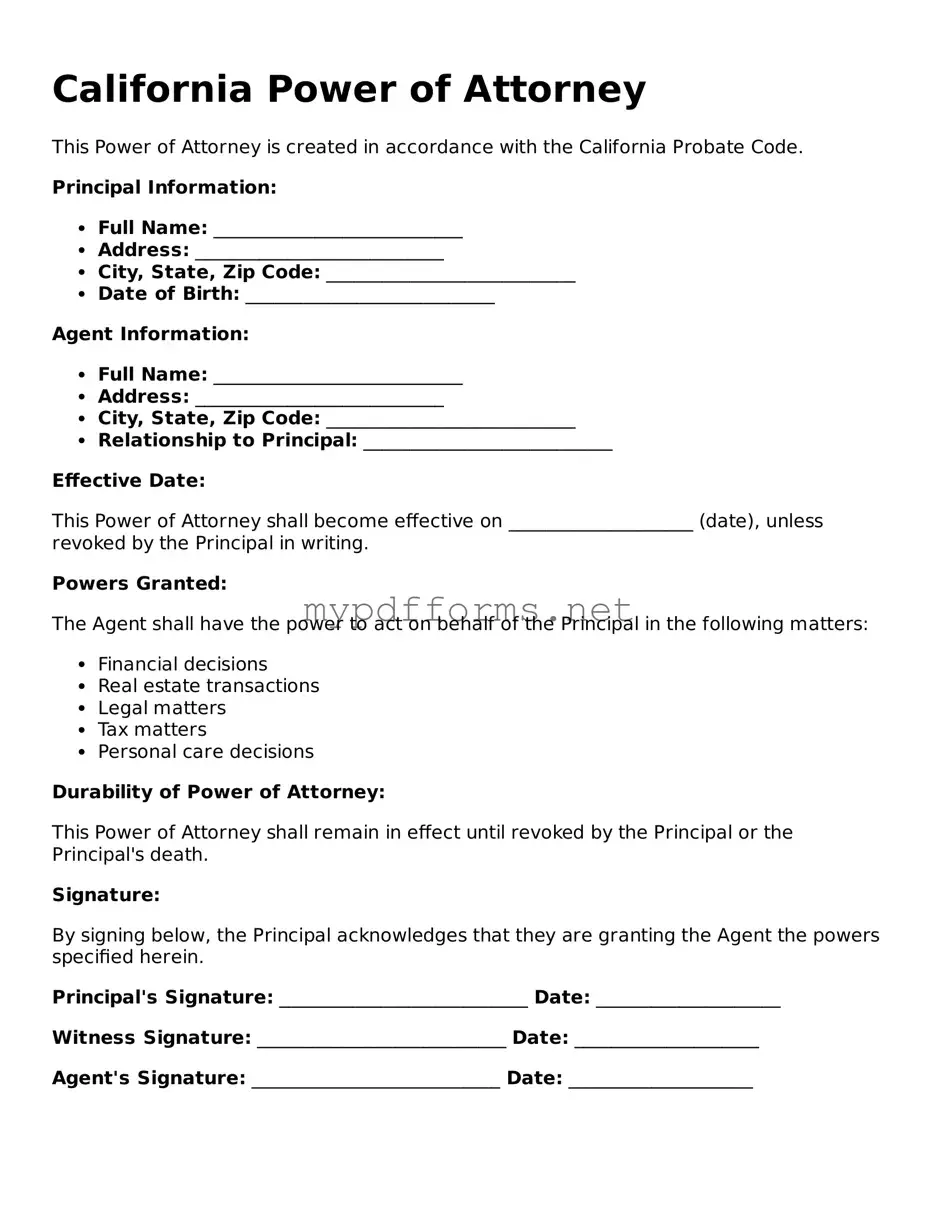The California Power of Attorney form shares similarities with a Durable Power of Attorney. Both documents allow individuals to designate someone to make decisions on their behalf. However, the Durable Power of Attorney remains effective even if the principal becomes incapacitated, providing ongoing authority to the agent. This feature is particularly important for individuals concerned about future health issues, ensuring that their financial and legal matters are managed without interruption.
Another document similar to the California Power of Attorney is the Medical Power of Attorney. While the California Power of Attorney typically addresses financial matters, the Medical Power of Attorney specifically grants authority to make healthcare decisions. This distinction is crucial, as it ensures that your medical preferences are respected and that someone you trust can advocate for your health when you cannot speak for yourself.
The Advance Healthcare Directive closely resembles the Medical Power of Attorney but goes a step further. It combines both the appointment of a healthcare agent and specific instructions about medical treatment preferences. This document allows individuals to outline their wishes regarding end-of-life care, making it an essential tool for those who want to ensure their values and desires are honored in medical situations.
A Living Will is another document that aligns with the California Power of Attorney. While the latter designates someone to act on your behalf, a Living Will explicitly states your wishes regarding medical treatment in situations where you cannot communicate. This document serves as a guide for your healthcare agent and medical professionals, ensuring your preferences are followed during critical moments.
The Revocable Trust shares some characteristics with the California Power of Attorney, particularly in managing assets. Both documents allow individuals to appoint someone to handle their affairs. However, a Revocable Trust also facilitates the transfer of assets upon death, avoiding the probate process. This can provide peace of mind for those looking to streamline the distribution of their estate while still retaining control during their lifetime.
The Guardianship document is another important legal tool. While a Power of Attorney allows for the management of financial and healthcare decisions, a Guardianship is typically established for individuals who cannot care for themselves, such as minors or incapacitated adults. This legal arrangement appoints a guardian to make decisions in the best interest of the individual, ensuring their well-being and safety.
For individuals considering their options regarding legal documentation, understanding the intricacies of the Power of Attorney form is vital. In states like Illinois, the process can be managed through easily accessible resources, allowing individuals to confidently appoint decision-makers aligned with their wishes. Those interested in this vital legal tool can explore Illinois Forms to ensure they take the necessary steps for their peace of mind.
The Conservatorship is similar to Guardianship but is specifically designed for adults who are unable to care for themselves or manage their finances due to incapacity. Like a Power of Attorney, a Conservatorship allows for the appointment of someone to handle personal and financial matters. However, this process usually requires court approval, making it more formal and often more complex than a Power of Attorney.
Lastly, the Business Power of Attorney is akin to the California Power of Attorney but is tailored for business-related decisions. This document allows an individual to authorize someone else to act on their behalf in business matters, such as signing contracts or managing company finances. It is particularly useful for business owners who may need assistance while traveling or during periods of absence, ensuring that operations continue smoothly.

